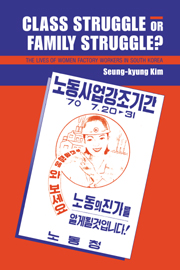Book contents
- Frontmatter
- Contents
- List of Tables and Figures
- Preface: Field, Subject, Author
- Acknowledgments
- Language Note
- 1 Women Caught between Global Capitalism and South Korean Patriarchy
- 2 The Process of Production in the Masan Free Export Zone
- 3 The Myth of Social Mobility: Its Creation and Reproduction among Women Workers
- 4 Labor Militancy and Collective Action
- 5 The Making of Working-Class Identity: Students' Theories and Workers' Lives
- 6 Conclusion
- References
- Index
Preface: Field, Subject, Author
Published online by Cambridge University Press: 02 December 2009
- Frontmatter
- Contents
- List of Tables and Figures
- Preface: Field, Subject, Author
- Acknowledgments
- Language Note
- 1 Women Caught between Global Capitalism and South Korean Patriarchy
- 2 The Process of Production in the Masan Free Export Zone
- 3 The Myth of Social Mobility: Its Creation and Reproduction among Women Workers
- 4 Labor Militancy and Collective Action
- 5 The Making of Working-Class Identity: Students' Theories and Workers' Lives
- 6 Conclusion
- References
- Index
Summary
As I have undertaken the long, slow process of converting the personal experience of my anthropological fieldwork into a book, I have been forced to reexamine the ambiguities of my position as a “native anthropologist” and to reflect on the many-faceted relationship between author and subject. The betwixt-and-between position of the native anthropologist has been discussed by various anthropologists (Jones 1970; Choong Soon Kim 1990; Kondo 1990; Narayan 1993; Ohnuki-Tierney 1984). As scholars have become concerned about the nuances in relationships between researchers and their informants/subjects, they have needed to pay more attention to the specific location or positionality of both the researcher and the anthropological subject, and they have stressed the need to incorporate this specificity into writing (Abu-Lughod 1986, 1991; Behar 1993; Clifford 1988; Crapanzano 1980; Narayan 1993; Rosaldo 1989; D. Wolf 1996). The variability in the positionality of researchers has increased as greater numbers of Third World anthropologists have written about people in their home countries. Complex issues of identity also surface when Western-educated feminist anthropologists try to represent lower-class female subjects from their home culture. Setting aside the issue of class differences, no matter how much anthropologists identify with and try to share the position of their subjects, they always remain “other” by virtue of being the ones doing the “studying” (cf. Narayan 1993).
Feminist scholars in other disciplines have also criticized the unequal relationship between researcher and subject in ethnographic research (Acker, Barry, and Esseveld 1991; Gluck and Patai 1991; Mies 1983; Personal Narratives Group 1989; Stacey 1991). Neither in research nor in writing can there be absolute equality between the researcher and the subject.
- Type
- Chapter
- Information
- Class Struggle or Family Struggle?The Lives of Women Factory Workers in South Korea, pp. ix - xxPublisher: Cambridge University PressPrint publication year: 1997



